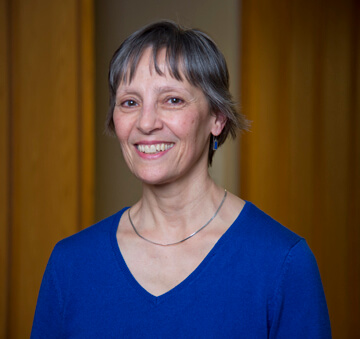Purdue Profiles: Elizabeth Akey
January 13, 2014
 |
|
Elizabeth Akey, clinical assistant professor of psychological sciences. (Purdue University photo/Steven Yang) |
Elizabeth Akey is committed to helping Purdue's clinical psychology graduate students gain the experience they need to become top-notch experts and practitioners in the field.
Akey is a clinical assistant professor of psychological sciences. In that role, she teaches, coaches and trains the graduate students who work at Purdue's Assessment Clinic, which serves children and adults with a range of issues, and Child Behavior Management Clinic, which serves children from four to 12 years old.
What are your job duties at Purdue?
I provide professional training for the clinical psychology graduate students who work in Purdue's Assessment Clinic and Child Behavior Management Clinic. At some point during their studies, every clinical psychology graduate student works in each of these clinics.
Both clinics are part of the Purdue Psychology Treatment and Research Clinics on campus. Each academic year, about three to six graduate students work in each clinic.
What is the Assessment Clinic?
The Assessment Clinic opened in 2009 and it helps clients -- children and adults -- to clarify a range of issues, including attention deficit hyperactivity disorder (ADHD), learning disabilities, anxiety and autism. The clinic also helps college-age people identify and manage learning disabilities. All clients are self-referred, so anyone who wishes to see us can contact us to get on the waiting list. We usually see eight to 12 patients each semester.
What is the Child Behavior Management Clinic?
It's a longstanding clinic that has been around for generations here at Purdue. It helps families with children from four to 12 years old who are dealing with ADHD, autism spectrum disorders, oppositional defiant disorders, anxiety and similar issues.
In all cases, the children's parents have asked us to work with them. Some of the children have already had diagnoses for their behavioral issues; with others, their parents are just beginning to identify and address the behavioral issues. Our clinicians work with parents during 10 to 12 one-hour sessions to provide training related to managing their child's behavior.
The waitlists for both clinics are quite short, so we encourage anyone who wants to see a clinician at the Assessment Clinic or the Child Behavior Management Clinic to call 49-46996. That's the general number for the Purdue Psychology Treatment and Research Clinics, and it can also be used for the Adult Services Clinic, which is supervised by Doug Samuel, assistant professor of psychological sciences. Folks who call can request to be placed on any of the clinics' waitlists.
How do the clinics help clinical psychology graduate students hone their skills?
In Purdue’s clinical psychology graduate program, our students are focused heavily on their research, but our clinics provide them with vital experience that will help them advance in either clinical or academic careers. The work our students do in the clinics informs their research, too, so in that way the experience is doubly useful.
About half of our graduate students go on to have academic careers and about half go on to have clinical careers. Our alumni are very successful -- in fact, we have a placement rate of 100 percent for clinical psychology graduate students, meaning they all find jobs once they finish their degree.
What are some of your professional activities outside of Purdue?
In West Lafayette, I operate a part-time practice that focuses on children with autism and ADHD. Just like our graduate students' experience in our clinics helps them with their academics, my experiences in my private practice help me with my job duties at Purdue.
My practice really keeps me on my toes professionally. And that's important, because I'm responsible for our graduate students' clinical work and for the welfare of the two clinics' clients. I need to be involved in both endeavors to be successful.
What's in the future for the clinics and for clinical psychology?
Next year, we're going to completely upend the clinics because they will be located in Lyles-Porter Hall. We'll have much better and more updated space, and we'll be located closer to some of the clinics that are part of other academic departments, including the Department of Speech, Language, and Hearing Sciences. I'm really looking forward to the fact that cross-departmental collaboration will be much easier once we move.
Also of interest is the fact that Psychological Sciences is working on a proposal with IU Health Arnett to help the system with its early autism screening. That collaboration is still not finalized, but it would be a great opportunity for our students. It's an exciting possibility to consider. The whole future of our program is very bright.
Writer: Amanda Hamon, 49-61325, ahamon@purdue.edu
